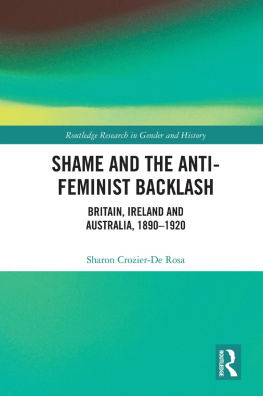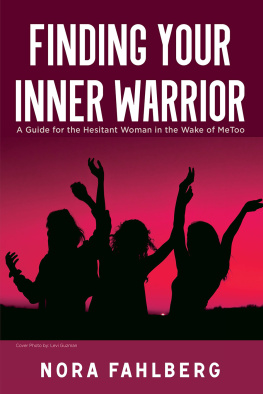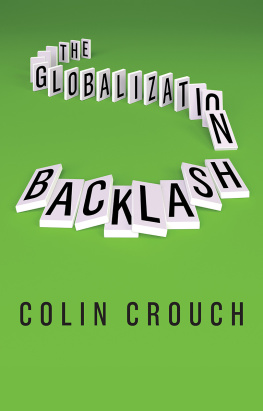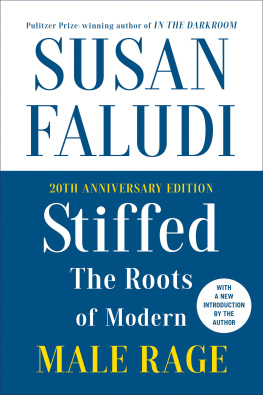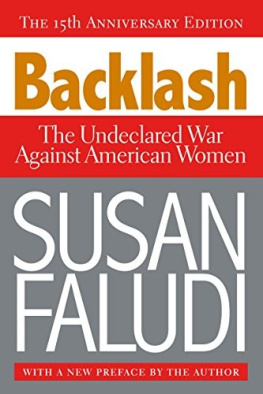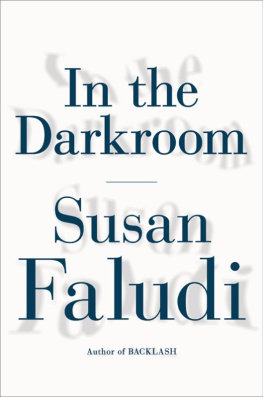
ACCLAIM FOR
Backlash: The Undeclared War

As groundbreaking... as its two important predecessors, Simone de Beauvoirs The Second Sex and Betty Friedans The Feminine Mystique... gripping.
LAURA SHAPIRO ,Newsweek
Fiery, scintillating... deserves the largest possible readership.
Booklist
A landmark book.San Diego Union
Spellbinding and frightening, this book is a wake-up call to the men as well as the women who are struggling to build a gender-respectful society.
ROBERT REICH , author of The Work of Nations
Brilliant reportage... astunning debut.
Kirkus Reviews
Chicago Tribune
Enraging, enlightening, and invigorating, Backlash is, most of all, true.New York Newsday
Faludi argues with great passion and impressive research.... Backlash may even be the catalyst for a new wave of activism.
Vanity Fair
The backlash against women is real. This is the book we need to help us understand it, to struggle through the battle fatigue, and to keep going.
ALICE WALKER
Thought-provoking, inspiring, and truly groundbreaking, Backlash is a must-read for women across the nation.
ELEANOR SMEAL , President, The Fund for the Feminist Majority
Faludi gives so many examples of reporting skewed to emphasize the adverse effects of independence and nontraditional roles for women, when ample evidence exists that such effects are often transitory, that one is left with no doubt that she is right.
DIANE JOHNSON ,The New York Review of Books
[Backlash is] wholly convincing and more than a little alarming.
The New Yorker
Withering commentary... This eloquent, brilliantly argued book should be read by everyone concerned about gender equality.
Publishers Weekly
Smartly written, extraordinarily reported.
M magazine
Backlash is a crucial book on a crucial subject. With great insight and wit, Faludi identifies the obstacles to womens equality and directs us toward more promising responses.
DEBORAH L. RHODE , Professor of Law, Stanford Law School, and former Director, Institute on Women and Gender, Stanford
If you believe... that equality is good for women, and that traditional gender roles are mandated unfairly by culture, not nature, youll find this book a valuable resource.
WENDY KAMINER ,The Atlantic

To my mother, Marilyn Lanning Faludi
Contents
PART ONE
PART TWO
PART THREE
Origins of a Reaction:
Backlash Movers, Shakers, and Thinkers
PART FOUR
Preface to the Fifteenth Anniversary Edition
E VERY SO OFTEN that perennial media topic Whither the womens movement? gets trotted out for examination, or rather for exorcismWither the womens movement might be a more accurate rendering of press sentiments. When it does, my phone often rings and a mildly irritated reporter asks, or rather huffs, the inevitable question: Is there still a backlash?
Because the reporters query is more of a complaint (Arent you done with this feminism business by now?), its hard not to respond in kind (Arent you sick of this lets-attack-feminism business by now?). Yet when I sat down to consider how to introduce the book I first published 15 years ago, I found myself bedeviled by a version of that same question: Is there a backlash? Still?
The answer, unfortunately, is no.
Unfortunately, because it turns out there are some things worse than backlash.
Back in the 80s, the slightest sign that women were exercising their independence set the culture hounds to baying. Were young women deferring nuptials for higher education? Youre more likely to be killed by a terrorist than to kiss a groom! the newsweeklies howled. Were older women postponing childbirth to pursue work they cared about? Your biological clock will strike midnight, and youll turn into a barren pumpkin! the lifestyle media mavens screeched. Were single women breaking courtship rules and taking the sexual initiative? Youll turn into a psycho-killer and meet your maker in an overflowing bathtub! the Hollywood mullahs decreed.
Ah, the good old days.
The backlash scolds are less in evidence now, so much less that to grouse about the few remaining haranguers would seem to quibble with success. When was the last time a twisted single woman boiled a bunny in a feature film? We appear to have vanquished those daily amber alerts about the man shortage, the infertility epidemic, and the dark side of divorce, not to mention the Job-like plagues of nervous prostration, heart disease, alcoholism, hair loss, and adult acne that were once said to be afflicting every hard-charging career woman.
Yes, there are still the periodic reprimands, though generally they are presented as the products of a womans choice. The backlash is now said to be a strictly self-inflicted affair. That was the message of a front-page New York Times story on September 20, 2005 that asserted that many female undergraduates at Ivy League colleges planned to junk their high-priced educations and stay home to tend to their babies. (I dont mind the status quo, a Yale sophomore cheerfully told the Times. I dont see why I have to go against it.) Choice was also the point of the New York Times Magazine cover story on October 26, 2003, The Opt-Out Revolution, which asserted that many female careerists were foregoing their fat salaries (though not their husbands) in favor of the stroller-pushing suburban life. (I dont want to be famous, one opt-outer told the Times. I dont want to conquer the world.) And that was the theme struck in a 60 Minutes report in April 2002 that held that more and more professional women were berating themselves for their choice and cashing in their lifes savings for infertility treatments.
But these lets-turn-back-the-clock appeals in the media lack the adamancy of the backlash trend stories of the 80s. The New York Times nervously hedged in its article on the Ivy League future homemakers, conceding that changing attitudes are difficult to quantify. (Indeed, the results of the newspapers e-mail survey of female students turned out to be hopelessly flawed, as a number of commentators later pointed out.) The author of the New York Times Magazines Opt-Out Revolution conceded that her conclusions were not a scientific sample. Even the writer of Atlantics March 2004 cover-story attack on working mothers who hire nannies, Caitlin Flanagan, confessed that she, too, employed a nanny.
The 80s-style carpet bombing of emancipated women appears to have been called off. What we hear now seems to be nothing more than random sniper fire. Were told that feminism has faded into the background because its aims have largely been achieved. Were told that young women dont identify with feminism anymore because they dont need to. As the young Yale undergraduate said in the Times, theres nothing left to go against.
On paper, at least, the undergrad appears to have a point. Women have made slow but steady gains in the last 25 years. They now represent nearly 60 percent of undergraduates, two-thirds of journalism school enrollments, and half of medical and law school students. The pay gap between men and women has narrowed by about a dozen percentage points in the last couple of decades (although 60 percent of that improvement is actually due to a decline in mens real earnings, not a rise in womens wages). About 15 percent of congressmen are congresswomen, hardly what youd cll representative democracy but better than the mere 3 percent who were female in the House and Senate in 1979. Women own about 38 percent of all businesses (although most are small and struggling businesses in the service sector). And 86 percent of Fortune 500 companies have at least one woman on their boards (albeit in most cases just



